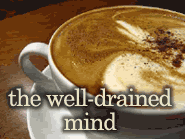Thanks to the book meme, I figured it's about time to mention what I'm currently reading.
Euclid's Window: The story of geometry from parallel lines to hyperspace, by Leonard Mlodinow. A very readable book, and the explanations of the geometry are easy and interesting so far; I'm about to learn about the Romans' role in the story. What I expected was a well-written overview of the development of mathematics from the perspective of geometry.
I didn't expect that I would also gain a better understanding of the relative contributions of the Sumerians and Mesopotamians (quite a lot of number theory and calculation; little to no creativity), the ancient Egyptians (a little calculation, very little creativity), and the ancient and classical Greeks (creativity galore!). I've learned a whole lot more about the major mathematical figures of the ancient world. I understand much better the tragedy of the destruction of the library of Alexandria.
It was very cool to be able to mention to Son1 yesterday during his math lesson on the area of a triangle, "the ancient Greeks were the first to think that a shape that exactly matches another shape really is the same." That was an essential concept for the way his textbook was presenting his lesson, though we weren't thinking twice about assuming it. Cool!
Er, I'm reading other stuff too. Because I'm thinking about how to get the boys ready for April's baseball practices, I picked up Parenting Young Athletes the Ripken Way, by Cal Ripken, Jr.
Most of the book was interesting; the rest was a peek into the late-teen sports world and the world of high-pressure parents (and how to get grounded and think of your kid first). Now I want to find some resources on baseball skill-building for my 7 and 11 year olds, since I have not a clue about this stuff. I hope to get a baseball glove in March and start playing catch with the boys and throwing grounders to them (which will require practice on my part!).
The other book I've started working on is a thick one, Chester Starr's A History of the Ancient World. It's remarkably readable for, at least physically, appearing such an academic, heavy book.
A couple of nights ago I read the first chapters, about prehistory (paleolithic, neolithic, etc.), the rise of civilization in various places (and how he defines that), and ancient Egypt. I'm really tired of Egypt nowadays, so I'm happy to be on the verge of other cultures in this book, and well past the Egyptians in Euclid's Window. The boys and I did our Egyptian study last fall and moved into Greece; I'm ready to pick it up again with Greece and then move into Rome. A History of the Ancient World is a library book and I want to get a good sense of the book before the due date to decide whether to renew it (or request it again later), or not. So far it's really interesting.
For my nonfiction book club in January we read The Price of Motherhood: Why the most important job in the world is still the least valued, by Ann Crittenden. I tried to finish the last two chapters, but I took a break because the hard truths in the book were very hard to read and made me angry. Kind of like James Kunstler's The Long Emergency last spring, but closer to home, because it's about the financial consequences of women choosing to have children, not only stay-at-home moms who never work full-time or who take a break from working full-time, though that's what hit close for me. Grrrr. I'm taking a break from finishing The Price of Motherhood.
Subscribe to:
Post Comments (Atom)






No comments:
Post a Comment